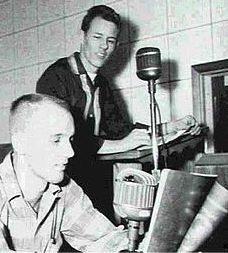
Jerry has always wanted to be in broadcasting. He
started hanging out at KBIX and KMUS, the two local radio stations in his home
town of Muskogee, Oklahoma when he was in Junior High School. Finally
after a couple of years, they got tired of him being a groupie, and gave him a
job as one of the youngest announcers in the history of radio station KBIX.
Radio was good to him, and he continued working full time and attended
Northeastern State University in nearby Tahlequah, Oklahoma. In 1961, he joined
the US Army where he was stationed in the San Francisco Bay area. The San
Francisco area was a hotbed of stand-up comedy in those years, and Jerry was
exposed to stand-up for the first time. He now had two loves, radio and
performing.
After the Army, he returned to KBIX in Muskogee, and in 1967 he became
part-owner and manager of KMMM-FM. Jerry did not like the business end of radio,
and he enjoyed performing, so he sold the radio station, and returned to
California to work in the Los Angeles market and pursued an acting/comedy
career.
|
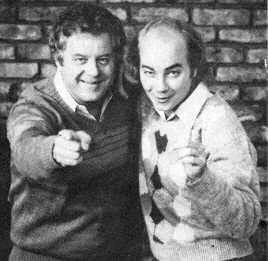
Stand-up
comedy took center stage in his life in the 1980s. He played almost every major
comedy club venue in the country as part of the comedy team of Pippin and
Sessions and ultimately owned and operated Comedy Clubs in Tulsa, Oklahoma;
Little Rock, Arkansas; Lincoln, Nebraska and Arlington, Texas. He also
syndicated the Comedy Minute that was heard on radio stations throughout the
country as well as an hour show of comedy cuts and comedian interviews called
"The Comedy Radio Network."
By 1987, Pippin had decided to get out of the comedy club business and return
to broadcasting because of a lucrative offer from KVEG in Las Vegas to do
another stint as an interview show host. He enjoyed the bright lights and
excitement of Las Vegas, and hosted a nationwide interview show originating from
the entertainment capital. His syndicated show was broadcast first on the
Independent Broadcasters Network, then Talk America, and later on his own ad hoc
network that claimed over a 189 affiliates, many in major markets such as
Phoenix, Dallas, Denver, Kansas City and Tampa. |
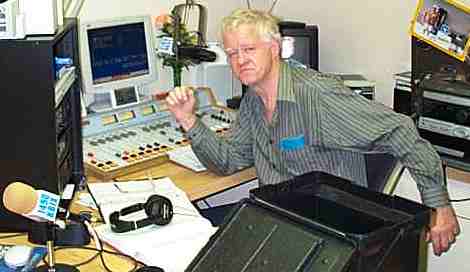 In
1998, Jerry returned to his home state, Oklahoma. He did an air stint at the
legendary Oldies station, KOMA, in Oklahoma City, and later he would also do a
show on KOOL-FM (KQLL) in Tulsa, an Oldies station. Clear Channel owners of
KQLL wanted an exclusive agreement and Jerry refused, therefore, ending his
Tulsa/Oklahoma City commute on the Turner Turnpike. In
1998, Jerry returned to his home state, Oklahoma. He did an air stint at the
legendary Oldies station, KOMA, in Oklahoma City, and later he would also do a
show on KOOL-FM (KQLL) in Tulsa, an Oldies station. Clear Channel owners of
KQLL wanted an exclusive agreement and Jerry refused, therefore, ending his
Tulsa/Oklahoma City commute on the Turner Turnpike.
This led to his creating a variety radio format for The Jerry Pippin Show and on
Halloween 1999, using elements of news/talk, oldies and personality radio, he
returned to where had started in radio, KBIX in Muskogee, which was streaming
its signal over the Internet. In 2000, he added the now highly successful UFO,
Paranormal and Elvis content and programming to the mix. In
2001 his show was voted Best Specialty RADIO program by the Oklahoma
Broadcaster's Association.
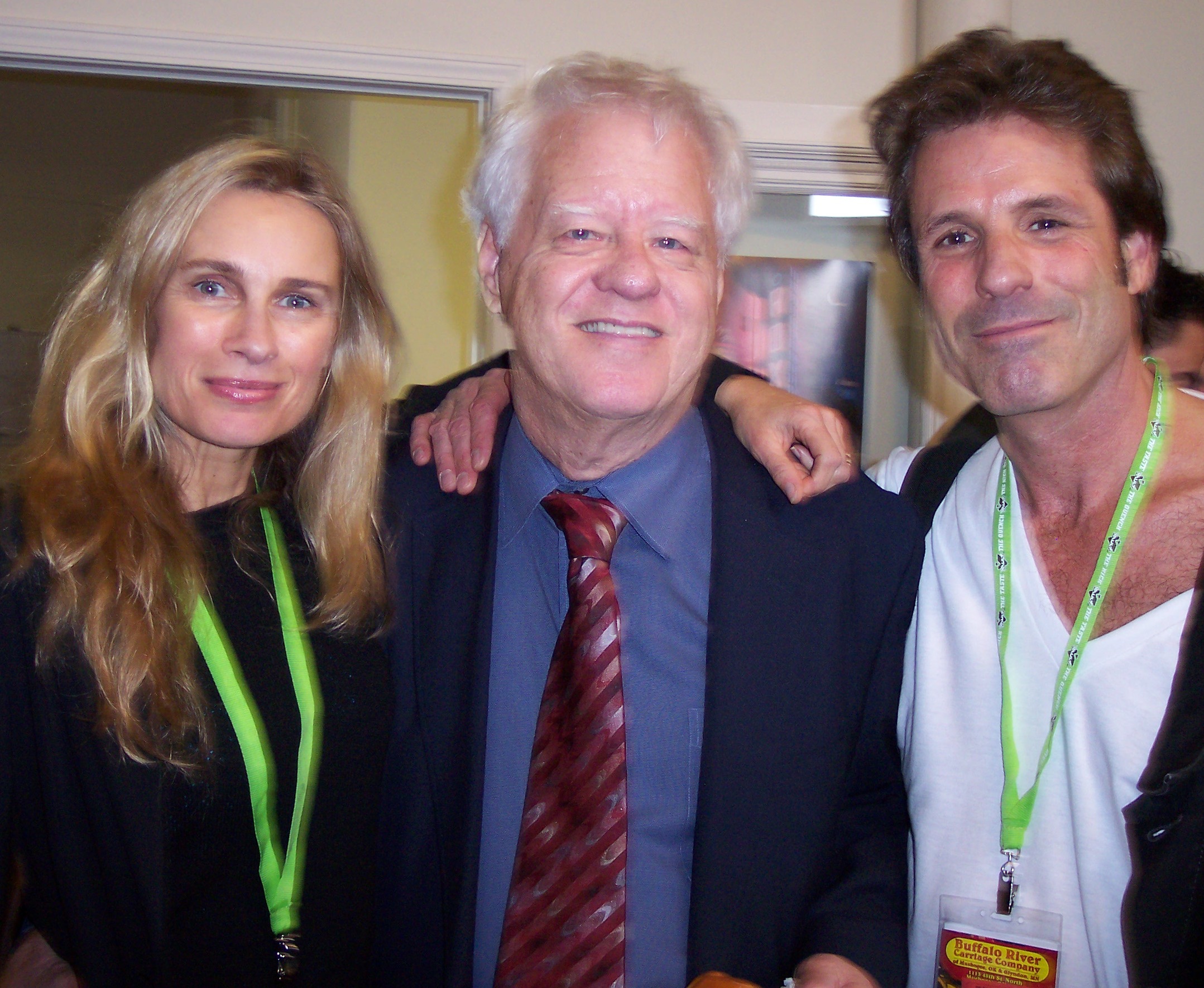 His
Memories of the 20th Century programs received special recognition from the
Oklahoma Broadcasters Association. He also received the 2003 Trail Blazer Award
at the Fourth Annual Bare Bones International Independent Film Festival, for
promoting Arts and Entertainment. This opened the door to implementing a
successful Internet radio project - on-demand 24/7 programming, that has grown
to reach millions of listeners around the world. His
Memories of the 20th Century programs received special recognition from the
Oklahoma Broadcasters Association. He also received the 2003 Trail Blazer Award
at the Fourth Annual Bare Bones International Independent Film Festival, for
promoting Arts and Entertainment. This opened the door to implementing a
successful Internet radio project - on-demand 24/7 programming, that has grown
to reach millions of listeners around the world.
In the fall of 2008, Jerry renewed his pledge to offer
objective, entertaining radio programming mixed with multi media presentations.
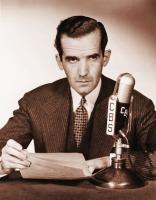 One
of Jerry's heroes was Edward R. Murrow who 50 years ago warned the industry that
over-concentration of media ownership and pursuit of commercial success
would push rates up and at the same time make the broadcasters prisoners of
their own success. We have seen the results of his warning coming true with less
investigative reporting and independence from special interests almost non
-existent in today's media world. Click here to hear Murrow's speech: One
of Jerry's heroes was Edward R. Murrow who 50 years ago warned the industry that
over-concentration of media ownership and pursuit of commercial success
would push rates up and at the same time make the broadcasters prisoners of
their own success. We have seen the results of his warning coming true with less
investigative reporting and independence from special interests almost non
-existent in today's media world. Click here to hear Murrow's speech:
 MP3 - Running time: 37 minutes, 07 seconds.
MP3 - Running time: 37 minutes, 07 seconds.
 Windows Media
Version Windows Media
Version
"Why do I continue when most people have retired? It's this situation that I
have, I have developed a voice of independence from big media restrictions yet
our audience has reached big media proportions. I want to continue offering
strong objective programs and yet keep a menu of entertaining things available
as well." Pippin stated.
 to listen to Jerry do personality radio on oldies KOOL-FM in Tulsa.
|


 In
1998, Jerry returned to his home state, Oklahoma. He did an air stint at the
legendary Oldies station, KOMA, in Oklahoma City, and later he would also do a
show on KOOL-FM (KQLL) in Tulsa, an Oldies station. Clear Channel owners of
KQLL wanted an exclusive agreement and Jerry refused, therefore, ending his
Tulsa/Oklahoma City commute on the Turner Turnpike.
In
1998, Jerry returned to his home state, Oklahoma. He did an air stint at the
legendary Oldies station, KOMA, in Oklahoma City, and later he would also do a
show on KOOL-FM (KQLL) in Tulsa, an Oldies station. Clear Channel owners of
KQLL wanted an exclusive agreement and Jerry refused, therefore, ending his
Tulsa/Oklahoma City commute on the Turner Turnpike.  One
of Jerry's heroes was Edward R. Murrow who 50 years ago warned the industry that
over-concentration of media ownership and pursuit of commercial success
would push rates up and at the same time make the broadcasters prisoners of
their own success. We have seen the results of his warning coming true with less
investigative reporting and independence from special interests almost non
-existent in today's media world. Click here to hear Murrow's speech:
One
of Jerry's heroes was Edward R. Murrow who 50 years ago warned the industry that
over-concentration of media ownership and pursuit of commercial success
would push rates up and at the same time make the broadcasters prisoners of
their own success. We have seen the results of his warning coming true with less
investigative reporting and independence from special interests almost non
-existent in today's media world. Click here to hear Murrow's speech: